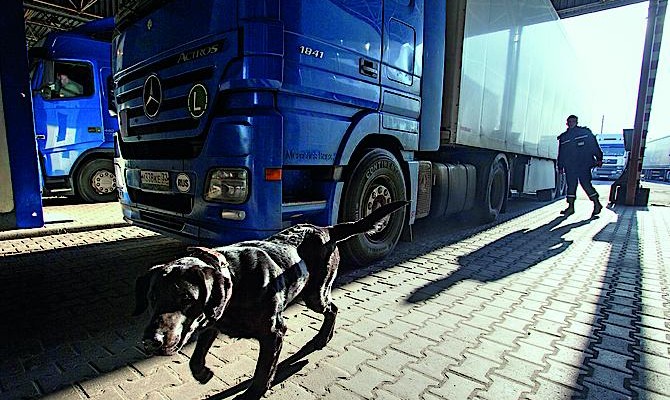Economy
tradeAdditional import duty will affect consumers and exporters

The Cabinet of Ministers proposes to introduce a temporary additional import duty (only for 2015) to reduce the negative balance of payments. The duty is the main topic of the two draft laws that the government submitted to the Verkhovna Rada on Tuesday in the package of documents required for approval of the national budget for 2015.
One of the bills provides introduction to the Customs Code of the necessary additions legitimizing the concept of “additional import duties” in the domestic legislative field. The other contains the specifics – lists of goods and products and rates of the duty. In particular, it is proposed to impose a 10% duty on products of animal and vegetable origin, fats and oils, as well as ready-made foods. For other commodities the duty will be 5%. An exception is made only for the “essential goods”, to which the Cabinet added natural gas, coal, oil and oil products, as well as humanitarian aid.
Noteworthy is that although the introduction of all sorts of additional restrictive barriers is not welcomed by the World Trade Organization, it accepts the use of such tools, albeit only temporarily and for the purpose of reduction of the current deficit in the balance of payments.
For the sake of the budget
The government argues the need for such innovations saying that introduction of the duty will help reduce the current deficit in the balance of payments, halt the loss of gold and foreign exchange reserves and increase revenues to the national budget, although the trade deficit this year has pretty much fallen due to the devaluation of the hryvnia. Imports of goods decreased in January–October by 39% to US $4.9 bn, according to the NBU.
“Devaluation of the hryvnia would be enough to eliminate foreign trade imbalances over the next year even without introduction of the additional duty,” said Head of the Analytical Department at the SP Advisors Investment Company Vitaliy Vavryshchuk.
It is quite likely that it will be impossible to stop the decline in gold and foreign exchange reserves, which as of the beginning of December have halved since the beginning of the year to US $9.96 bn, through the decrease in non-energy imports. Experts believe that reserves can only be saved by the inflow of foreign currency.
Despite that introduction of the additional duty is likely to lead to reduction in imports, the Cabinet still anticipates an increase in revenues from import duties from UAH 15.6 bn in 2014 to UAH 31.5 bn in 2015.
Burden for consumers
In truth, average consumers of imported products will have to pay for the whole ‘banquet’, especially for those products that cannot be substituted by domestic counterparts. For consumers the duty will result in a rise in prices of a number of food products. Indeed, they will have to pay more for many types of imported fruits, the prices for which have on average increased by 49% since the beginning of the year and for fish and seafood products (since the beginning of the year their prices have grown by 30%).
Representatives of the PharmUkraine association say that the prices of medicines and medical equipment will grow in addition to the 40% increase due to the devaluation of the hryvnia and the introduction of the 7% VAT in April.
There will be another surge in the prices of imported household appliances, which have risen by 23%, and passenger cars, the prices of which grew in local currency by 56%. Head of the All-Ukrainian Association of Automobile Importers and Dealers Oleh Nazarenko believes that even if next year the volume of imports of cars will remain at the current level – close to 100,000 – due to the introduction of the additional duty only one fifth of them will be officially imported into the country, while the remaining 80,000 will be imported through other schemes.
Boomerang effect
The duty may even have the opposite effect on the trade balance of the country, affecting exports. Many domestic export-oriented companies manufacture products using imported raw materials or components. This means that the duty will increase their costs and undermine competitiveness of Ukrainian exports abroad. For this reason, Ukrainian steel workers value iron ore and ferroalloys, which have a better chemical composition and are subject to duty, says Director of the Legal Department at the Donbas Industrial Union Corporation Serhiy Tkachenko. “The government is trying to influence the foreign exchange balance of the country practically increasing the cost of Ukrainian metal and, consequently, reducing its competitiveness on foreign markets and thereby creating preconditions for reduction of the amounts of foreign currency proceeds of metallurgical enterprises,” he said.
The duty will force a postponing of capital investment in many sectors of the economy. “Seeing as the duty is being introduced temporarily, companies will simply postpone their purchases of equipment for the year,” says Vavryshchuk.
Therefore, business and industry associations suggest that at the very least the government should review the list of imported goods that will be subject to the additional duty. “It would be right to exclude high-quality imported raw materials, which are used in Ukraine for the manufacture of products with high added value and are in high demand on world markets,” Tkachenko believes.






 of the agreement of syndication with Financial Times Limited are strictly prohibited. Use of materials which refers to France-Presse, Reuters, Interfax-Ukraine, Ukrainian News, UNIAN agencies is strictly prohibited. Materials marked
of the agreement of syndication with Financial Times Limited are strictly prohibited. Use of materials which refers to France-Presse, Reuters, Interfax-Ukraine, Ukrainian News, UNIAN agencies is strictly prohibited. Materials marked  are published as advertisements.
are published as advertisements.